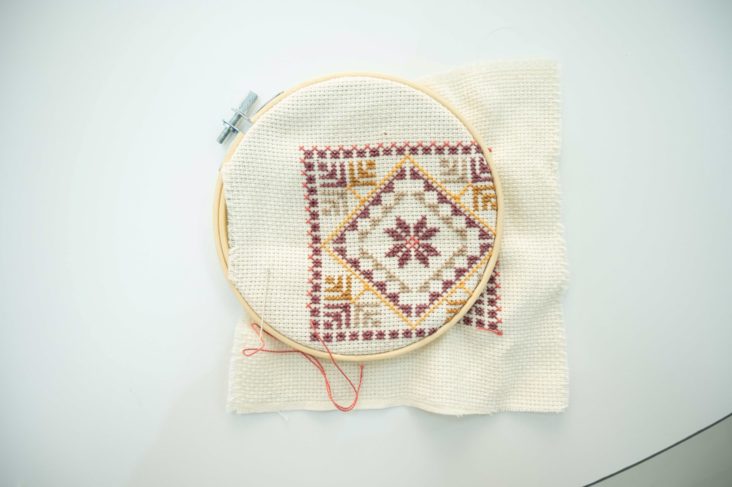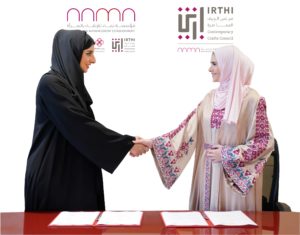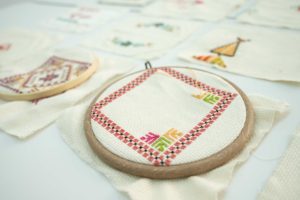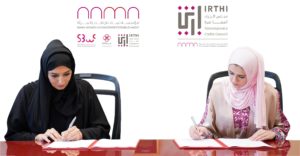Irthi’s New Training Programme Will Teach 15 Emirati Women Artisans Palestinian And Jordanian Embroidery

As part of its mission to empower women artisans in the UAE and the region through the crafts, Irthi Contemporary Crafts Council, an affiliate of NAMA Women Advancement Establishment, has launched a new training programme in Jordanian and Palestinian embroidery.
Under the new programme, 15 Emirati women trainees between the ages of 18 – 45 are to receive skills training under Majida Abu Zaghlan, fashion designer and owner of Jordan-based label and social enterprise Saru Fashion.
Zaghlan will train them in the crafts of Palestinian and Jordanian embroidery over a five-month period. Her label is specialised in promoting traditional embroidery, and Zaghlan’s work over the past three years involved training 130 Palestinian refugee artisan women at the Gaza camp in Jerash, Jordan, whose income supported 25 families in the camp.
The launch of the programme follows on from a partnership agreement signed between Irthi and Saru Fashion. Under the terms of the agreement, the Emirati trainees will be trained in over ten types and techniques of Palestinian and Jordanian embroidery.
Zaghlan has gained a reputation as a tireless advocate for refugee women artisans from Palestine, developing their skill sets to match international standards and showcasing their work to a global audience. She will be joined by two artisans she had previously trained in the Gaza Camp in Jerash, Jordan, to teach their Emirati counterparts the intricate embroidery skills practiced in the west Levant region.
Reem BinKaram, Director of NAMA Women Advancement Establishment, said: “Irthi’s commitment to the preservation of vital cultural skills and mission to empower women through the crafts across the UAE and MENASEA is being taken forward through this programme as we seek to develop prominent regional crafts and contextualise them into the contemporary narrative. The rich colours and textures of Palestinian and Jordanian embroidery are the hallmarks of a traditional culture and have a strong cultural significance.”
“Such initiatives have been established in pursuance of the vision of Her Highness Sheikha Jawaher bint Mohammed Al Qasimi, wife of His Highness the Ruler of Sharjah, Chairperson of NAMA and Founder and Royal Patron of Irthi, for women’s empowerment and capacity building in the crafts sector both in the UAE and the wider region, while developing new market opportunities with a mission to encourage future generations in continuing this legacy,” she added.
“The programme will enhance the technical capacity of Emirati women of various skill levels and ages, while also encouraging social interaction between regions and cultures. The final product outcomes of this programme will utilize Palestinian and Jordanian embroidery techniques to portray Emirati-inspired motifs and designs.” said Reem BinKaram.
The programme will focus on developing two types of skill sets for both Emirati trainees and the Palestinian artisans. This will include soft skills such as team building; communication skills; time management skills; conflict resolution and decision making; creative thinking; and presentation skills.
Under the technical skills training will include the teaching of embroidery techniques such as cross stitch and Ragmeh, a distinctive embroidery stitch from Jordan that gives the classic square or diamond shape, and the technique of the popular couching embroidery.
Emirati artisan trainees will also learn how to incorporate a range of daily life motifs and Bedouin floral patterns into their embroidery practice. They will receive training on designing the thobe, the traditional brightly embroidered dress of Palestinian women. Apart from learning colouring techniques to enhance the appeal of the embroidery patterns, the trainees will also be taught the classic designs used for men’s garments.
The programme’s final product range will be showcased by Irthi Contemporary Crafts Council in local and international markets to further expand the programme’s impact on the artisans and trainees from both countries.




